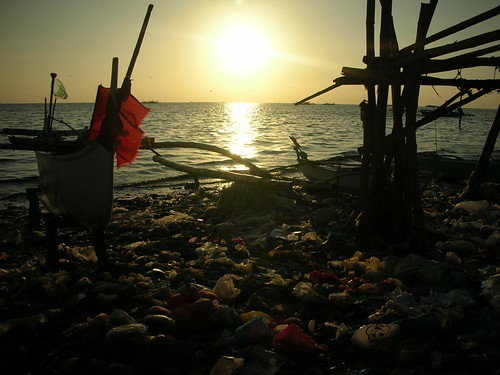Communcation web-site on ecology in Asia (and the rest of the planet)
Hello everyone. I used to be a student of Professors Wittstock and Szell in CSR for Sustainable Development back when I was an exchange student in SNU. Now, my groupmates and I are conducting a study on a strategy of Integrated Coastal Management, particularly on Coastal Clean-up on one of our major historical landmarks in the Philippines - Manila Bay.
Every year of September 15, the International Coastal Clean-up is being done in coastal areas throughout the world. But, what has been a bit mind-boggling to us is that this clean-up strategy does not seem to fit the concept of attaining sustainable development.
I mean, the solid wastes are being cleaned out of the bodies of water, but the grade of water remains unchanged. And after the clean-up, a few days later (or probably a few hours later) another batch of garbage are bound towards the coasts.
Do you think that this Coastal Clean-up as an ICM strategy is just supplementary and not really meant for the pursuit of Sustainable Development?
I would like to know everyone's thoughts about this one. Domo arigatou/Kamsahamnida/Vielen danke and Thank you very much ^_^
(Manila Bay, Roxas Boulevard - Sunset)
(Solid waste meets Manila Bay in Navotas)
Every year of September 15, the International Coastal Clean-up is being done in coastal areas throughout the world. But, what has been a bit mind-boggling to us is that this clean-up strategy does not seem to fit the concept of attaining sustainable development.
I mean, the solid wastes are being cleaned out of the bodies of water, but the grade of water remains unchanged. And after the clean-up, a few days later (or probably a few hours later) another batch of garbage are bound towards the coasts.
Do you think that this Coastal Clean-up as an ICM strategy is just supplementary and not really meant for the pursuit of Sustainable Development?
I would like to know everyone's thoughts about this one. Domo arigatou/Kamsahamnida/Vielen danke and Thank you very much ^_^
(Manila Bay, Roxas Boulevard - Sunset)

(Solid waste meets Manila Bay in Navotas)

Views: 101
Replies to This Discussion
-
Well, I would hope for the Keio people to comment on this, we're near the sea as well!
-
Hi Stephanie,
I think the ICM as a CSR-strategy should rest at least on two pillars. Cleaning up the waste and reducing further pollution to a minimum.
Suppose this: you have a house and celebrate a big party, just for the fun of it. However, your guests leave a big mess in the living room. As you live in that house it is not enough to decide that you will not add any more waste. First thing you will do quite naturally is clean up. No need to say that you will take further good care of your house and before the next party, you will educate your guests. If they mess up again, there will be no more parties, if they have fun and keep things in order, they will be welcomed back a thousand times.
On the other hand, if you did not clean up, soon no one would show up for the parties in the ugly house.
But how realistic is it to have a party without something going wrong. There is always someone who spills a drink or drops some food on the carpet. That is normal and we do not make a fuss about it and just clean up. Otherwise everyone would be sitting on chairs not moving and pretending to be dead. So I think, even if everyone does their best, there will still be things going wrong and we should just fix them.
Clean ups are necessary.
Beste Grüsse
Claus
-
Thanks for providing such a simple yet brilliant insight...
I agree with what you said...
-
Hi again,
well, I agree whit what you guys said, and agree that clean-ups are a good thing in general. But the garbage on your picture seems to be on a different level we are used to in Japan. So I wonder who is responsible. If the production of garbage doesn't stop, the clean-ups don't help much.
Fortunately, in Japan it's a bit better. If seems that the manners related to garbage-disposal have significantly improved. So, in order to remove the stuff that has been inadvertently thrown out, or by the few people who still don't care, the clean-up-walks by volunteers seem to be sufficient. I was at the beach in Shonan recently, it looked pretty nice, and the cleaner it is, the less inclined people are to throw something there...
But it seems a long way to go on your side of the ocean!
© 2026 Created by juergen wittstock.
Powered by
![]()